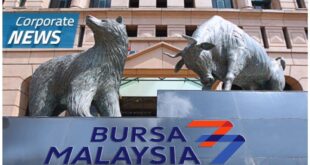WHEN Vietnam’s electric-vehicle maker VinFast Auto Ltd announced plans to go public in the United States in May, I said the richly valued deal marked the return of special-purpose acquisition company (SPAC) silliness and the stock would likely be volatile due to the low number of shares available for trading.
On hindsight, these were massive understatements. After completing a blank-cheque merger earlier this month, VinFast’s market capitalisation had soared to US$190bil by Monday’s close – making it the third most valuable automaker in the world, behind Tesla Inc and Toyota Motor Corp.
By the same token, entrepreneur Pham Nhat Vuong is now one of the world’s richest people, because entities he controls own almost all of VinFast’s shares.
Yet these paper values are essentially meaningless and will likely prove short-lived. A minuscule fraction of the 2.3 billion shares outstanding are available for trading. It doesn’t take much to pump a tiny float, and retail investors have merrily taken advantage.
In recent trading sessions, the entire float has changed hands in one day and the value of those shares has increased around eight times.
Although VinFast is hard to short and the vast majority of shares are governed by lock-up agreements and can’t be sold yet, VinFast speculators are playing with fire. The automaker’s financial fundamentals are poor and its vehicles have received scathing reviews.
The architects of this transaction –VinFast and Hong Kong-based Black Spade Acquisition Co – ought to have known the shares might take off like this.
I first began writing about low-float SPACs two years ago. Since then, there have been several instances of SPAC-backed firms going public with tiny floats and then briefly rocketing – in some instances enriching company insiders in the process.
The cause is always the same – high redemptions – a posh way of saying the majority of SPAC shareholders demand their money back rather than fund the merger.
By redeeming, SPAC shareholders are effectively saying: We don’t find the valuation compelling. By bidding up the shares after the merger is completed, retail investors are effectively saying: We don’t care.
In VinFast’s case, 92% of shareholders scoffed at the purported US$23bil equity value and redeemed it.
Because so few shareholders supported the deal, Black Spade’s founders were forced to provide a financial backstop to ensure the agreed minimum of US$30mil cash was raised.
Those high redemptions left a float of just 1.3 million shares, though there may now be more: This filing shows almost three million shares were released from lock-up restrictions earlier this month by mutual agreement between VinFast and the SPAC sponsor.
Almost 15 million warrants to acquire VinFast shares will also soon become exercisable, including those owned by Black Spade, but otherwise the SPAC sponsor’s shares are locked up for one year, while Vuong’s are locked up for 180 days, according to the prospectus.
In theory, VinFast could attempt to capitalise on its high stock market value via a secondary offering – it certainly needs the money. The company had just US$159mil of cash at the end of March and almost US$6bil in accumulated losses.
However, selling more stock would probably cause the price to sink because a larger float would make it harder to squeeze.
Somewhat surprisingly, private equity giant KKR & Co Inc appears to have a horse in this race. KKR, Qatar Holding LLC and Singapore-based Seatown Holdings International Pte Ltd (indirectly owned by Temasek Holdings Pte) were among investors who last year lent a total of US$625mil to parent company Vingroup JSC.
Those bonds are exchangeable into VinFast shares, the prospectus states, though not until six months after the completion of the SPAC merger. So while on paper KKR’s option is now very valuable, I’m sceptical whether it can immediately take advantage. — Bloomberg
Chris Bryant is a Bloomberg Opinion columnist. The views expressed here are the writer’s own.
 BeritaKini.biz Berita Viral Terkini di Malaysia
BeritaKini.biz Berita Viral Terkini di Malaysia





